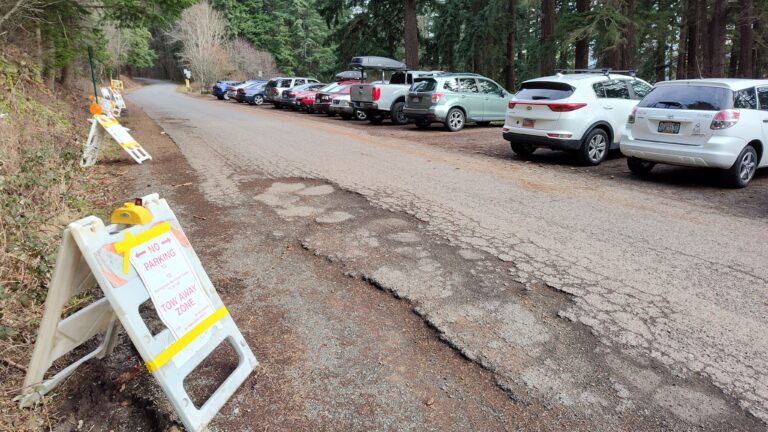Editor,
LL Brakke (CDN Letters April 27) needs to carefully reread Ralph Schwartz’s thoughtful article about Fairhaven’s residential core folks’ opposition to a City of Bellingham-mandated sidewalk for a new development at Donovan and 8th Streets (CDN April 13).
Brakke defames us as not concerned about environmentally inappropriate and harmful development or wildlife or Padden Creek and salmon protection or the loss of affordable housing. Brakke condemns us for rejecting “safer” sidewalks rather than trying to understand how our current narrow streets, with unpaved shoulders actually slow traffic and allow all users — pedestrians, cyclists and children playing, to safely share them. Brakke should be aware that narrow streets with unpaved shoulders or drainage ditches are better ways to handle toxic road runoff and protect adjacent waterways than wider streets with paved sidewalks and curbs and gutters that add to stormwater and treatment burdens.
It’s surprising that Brakke is unaware that the Fairhaven residential neighborhood has been in the forefront of environmental and social advocacy for decades: leading the effort to protect the heron colony; opposing the spreading of toxic bio-sludge across the countryside; protecting and restoring Padden Creek and working for its daylighting; supporting the protection of the Hundred Acre Wood and preserving it for public use; our annual tree and plant sales help support several worthy environmental and social causes in our city; we help to protect and maintain several trails that we gladly share with others; welcoming and supporting the tiny homes project to our neighborhood; actively engaging in and supporting progressive city planning efforts.
Brakke: Where have you been all these decades? Perhaps your animus would be better directed at certain parts of City Hall and some of its poorly-crafted rules and mandates rather than with a neighborhood that consistently works for social and environmental good?
Please pay us a visit, we’ll give you a tour of our slow, safe and shared streets. Then we’ll accept your apologies.
Preston L. Schiller
Bellingham
Editor,
Re: Mike Adkinson’s journey for Parkinson’s
Thank you, Audra Anderson and Cascadia Daily News, for the excellent reporting on Mike Adkinson’s 1,700-mile tractor trip to raise awareness of and funding for Parkinson’s disease. As a Person with Parkinson’s (PwP) myself, I know firsthand the value — and dare I say, necessity? — of community support for PwPs and their families, friends and care teams.
Fine national organizations like Michael J. Fox Foundation, American Parkinson’s Disease Association, Davis Phinney Foundation (fair disclosure: I volunteer with them as an ambassador) and Parkinson’s Foundation already offer indispensable information and services to those impacted by Parkinson’s.
Meeting specific needs at the local level, however, can be more elusive. Your article’s inspiration, however, offers a unique opportunity to bring together Whatcom County’s extended Parkinson’s family to identify and address our specific unmet needs.
If your readership thinks this is a good idea and would like to start an informal “clearinghouse” to gather and organize information, services and contacts, I would be delighted to serve that role and can be reached through my ambassador page at Davis Phinney: davisphinneyfoundation.org/ambassador/wendy-miller.
Again, thank you to Mike and to you at Cascadia Daily News for shining a spotlight on this important cause.
Wendy Miller
Bellingham
Editor,
Re “Bellingham’s Rising Rents Symptom of Nationwide Scourge” (May 5): Since the state has a law that directly restricts rent increase, and doesn’t seem willing to change it, and since landlords complain about rising costs and property taxes, maybe the city or county could tax unreasonable increases (say, over 7% in a year) and put the revenue from that tax into building affordable/subsidized apartments. Determination of “unreasonable” would consider current costs and property taxes, for example.
John Holstein
Bellingham
Editor,
I appreciate the column by Imran Sheikh, Stevan Harrell, and Ray Kamada. On most of what they say, we “are in violent agreement”, e.g.:
1. If air conditioning in the summer is contemplated or needed, then yes, a heat pump is a no-brainer.
2. On most days in winter, the ductless heat pump is efficient (energy moved, divided by energy expended).
But: Too risky, abandoning a gas hookup, as a backup to electric heat pumps. Yet the Mayor’s climate plan plans to stop gas hookups to new construction.
Unfortunately, our electric distribution system always has been, is, and will likely remain, subject to weather- or grid-related blackouts. During those times, which can last from hours to days to (in a few cases) a week, an all-electric household without backup will not be able to heat or cook. Fixes to this are variously very expensive, dangerous or polluting:
(a) Install a Li-ion battery bank (e.g., Tesla Wall). Spend >$20-30,000 to get two days of backup for a single home. Very expensive. And make sure it’s perfectly regulated, or you could have a fire.
(b) Have a contractor install a >5-kW propane-fired generator on a concrete pad. Store about 100 gallons of compressed propane on-site. Moderately expensive ($15,000) capital expense. All that propane is dangerous, in case of fire. Propane environmentally is problematic, too.
(c) Buy a >5kW gasoline-fired generator, place it on your driveway or in your garage with the door open, run it off about 100 gallons of stored gasoline and run extension cords into your house. Terrible in so many ways; dangerous, polluting, noisy.
The compromise is to have safe, piped methane (natural gas) still arriving at your gas meter, letting you use your heat pump when it works, but permitting a stand-alone natural-gas heater to keep you warm during electric outages. Our Jotul natural-gas heater does precisely that for us during electric outages, running convection-only, without the fan, venting with a through-the-wall flue. If you choose to have a gas cooktop (above an electric oven), then you can light a burner using a match, without electricity. A negligible amount of gas is used for a cooktop, in the scheme of things.
It is not enough to simply dismiss natural gas as “yesterday’s fuel.” One is obligated, when touting all-electric, to plan a backup capability. But I’ve not seen that even acknowledged in the Mayor’s plan.
Abe Jacobson
Bellingham
Editor,
The 4/27 issue of the CDN gave prime positioning to the article headlined: “Fentanyl fuels overdose deaths; drug surpassed other opioids in 2017.” However, there is no factual information supporting anything about opioids in 2017. The article references a “Department of Health dashboard” (Washington State? Whatcom Co.?), noting there were fentanyl-related deaths in 2020 (15) and 2021 (25).
That is the only information that supports any of the headline. I don’t doubt that Mr. Frank and Mr. Hewett have a great deal of experience dealing with the effects of individuals experiencing overdose. But additional research with additional personal references from persons who are experts in the field of substance abuse disorder and of treatment, especially opioid treatment, should have been included. Anecdotal stories do not make the mark.
Toward the end of the article, Mr. Hewett suggests that a lack of local treatment facilities is an obstacle to reversing the overdose trend. How about following that thread? Treatment for opiate dependency is usually different from treatment for other substances, involving MAT (medication-assisted treatment). The Whatcom County State Certified Substance Use Disorder Treatment Agencies webpage shows four agencies (Lummi Care makes five) offering MAT. Information about MAT would be good to include in an article involving opiate recovery, as many people are unfamiliar with it.
Are the Whatcom County providers of this treatment at capacity? There is no methadone treatment in Whatcom County. Why is that? Besides treatment, what about fentanyl test strips? Are they legal? Feasible? Being discussed? What is the role of the Health Department in this matter? There is so much we didn’t learn from reading this article. The topic deserves “above the fold” placement in our news (thank you CDN for that), and it deserves solid articles that truly educate the reader.
Karen Burns
Bellingham



Commentary response: Nursing-home staffing mandates critical to dignified care